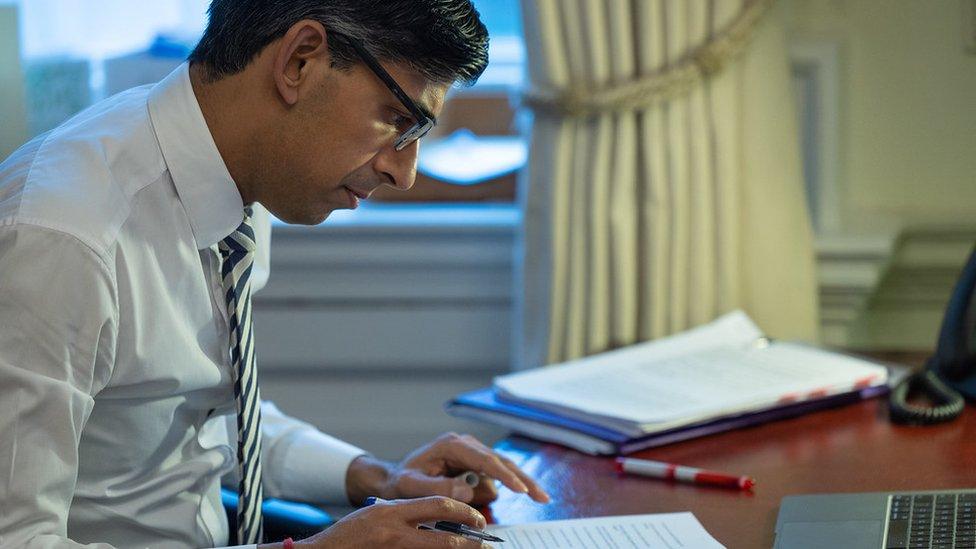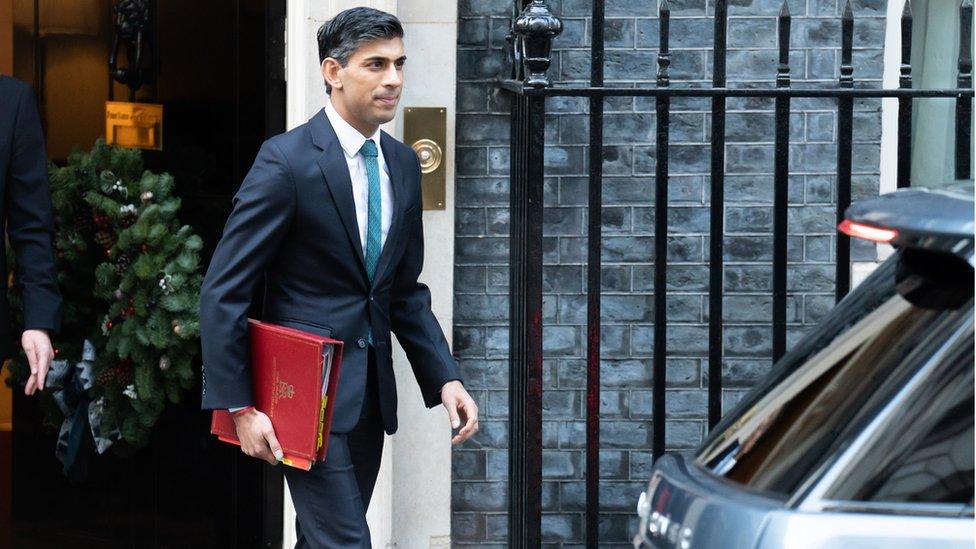Rishi Sunak wants all pupils to study maths to age 18
- Published
- comments

Rishi Sunak is due to set out his plans for the year ahead in his first speech of 2023
The prime minister is looking at plans to ensure all school pupils in England study maths in some form until the age of 18.
In his first speech of 2023, Rishi Sunak said he wanted people to "feel confident" when it came to finances.
But critics have said the plan will not be possible without more maths teachers.
Mr Sunak also set out the priorities for his premiership, including tackling backlogs in the health service.

The number of 16 to 18-year-olds is projected to rise by a total of 18% between 2021 and 2030.
In his speech, Mr Sunak said the UK must "reimagine our approach to numeracy".
"In a world where data is everywhere and statistics underpin every job, letting our children out into that world without those skills is letting our children down," he said.
He said he wanted people to have the skills they needed "to feel confident" with finances and things like mortgage deals.
Just half of 16 to 19-year-olds study maths, according to Mr Sunak - but this figure includes pupils doing science courses, and those who are already doing compulsory GCSE resits in college.
It is not clear what the plans will mean for students who wish to study humanities or creative arts qualifications, including BTecs. No new qualifications are immediately planned, and there are no plans to make A-levels compulsory.
The government is instead exploring expanding existing qualifications as well as "more innovative options", a Downing Street spokesperson said.
The idea appears to be an aspiration rather than a fully developed policy, with the precise mechanics for how it would work not set out.
The government acknowledges it would not be possible to implement before the next general election, although the prime minister is expected to begin working on the plan in this Parliament.
The Autumn Statement unveiled an extra £2.3bn in core school funding for five to 16-year-olds over the next two years - reversing the real-terms cuts of the last decade.
However, no extra funding was given to further education colleges, which teach many of the most disadvantaged 16 to 18-year-olds, nor to sixth form colleges.
'Severe shortage'
Sir Peter Lampl, founder and chairman of the Sutton Trust social mobility charity and chairman of the Education Endowment Foundation, welcomed Mr Sunak's aspiration and said the focus should be "on giving young people the practical maths skills that they need in the workplace and in their everyday lives".
However, the Association of School and College Leaders said there was a "severe shortage of maths teachers", and that the plan was "therefore currently unachievable".
In 2021, there were 35,771 maths teachers, external in state secondary schools in England. There were more English teachers (39,000) and science teachers (45,000).
Maths teacher numbers are 9% higher than in 2012, but shortages have been reported across the country.
A survey of secondary schools in England, external by the National Foundation for Educational Research found that 45% of respondents used non-specialist teachers to deliver some maths lessons in 2021.
'Show working'
Labour's shadow education secretary Bridget Phillipson called on Mr Sunak to "show his working" on how greater participation in maths will be funded.
"He cannot deliver this reheated, empty pledge without more maths teachers, yet the government has missed their target for new maths teachers year after year," she said.
Liberal Democrat education spokesperson Munira Wilson called the aim "an admission of failure from the prime minister on behalf of a Conservative government that has neglected our children's education so badly".
She added: "Too many children are being left behind when it comes to maths, and that happens well before they reach 16."
Mr Sunak's speech emphasised the importance of family, but it was light on plans for early years education - another sector that went without extra funding in the Autumn Statement.
Purnima Tanuku, chief executive of National Day Nurseries Association, said it showed "a lack of understanding" about the importance of early years.
Tory MP Robin Walker, who is chairman of the education committee, urged the prime minister to focus on childcare.
"It's great to hear the prime minister today committing to maths beyond 16," he told BBC Radio 4's Today programme. "But if we don't get the right approach to stimulating and supporting children early on, they won't have the opportunities to thrive in the school system."
'Silver bullet'
The prime minister also said education was "the closest thing to a silver bullet there is".
As well as a new approach to numeracy, his proposals included better attainment at primary schools and more technical education.
Last year, 59% of children leaving primary school in England reached the expected standards in reading, writing and maths.
That is well below a target announced last year of 90% by 2030.
Additional reporting by Lucy Gilder.
Related topics
- Published31 December 2022

- Published18 May 2022
